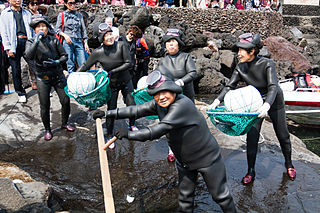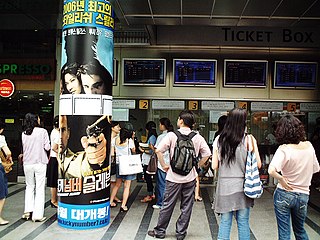
The action film is a film genre which predominantly features chase sequences, fights, shootouts, explosions, and stunt work. The specifics of what constitutes an action film has been in scholarly debate since the 1980s. While some scholars such as David Bordwell suggested they were films that favor spectacle to storytelling, others such as Goeff King stated they allow the scenes of spectacle to be attuned to story telling. Action films are often hybrid with other genres, mixing into various forms ranging to comedies, science fiction films, and horror films.
The year 1975 in film involved some significant events.

The term "Cinema of Korea" encompasses the motion picture industries of North and South Korea. As with all aspects of Korean life during the past century, the film industry has often been at the mercy of political events, from the late Joseon dynasty to the Korean War to domestic governmental interference. While both countries have relatively robust film industries today, only South Korean films have achieved wide international acclaim. North Korean films tend to portray their communist or revolutionary themes.

The South Korea national football team represents South Korea in men's international football and is governed by the Korea Football Association. South Korea has emerged as a major football power in Asia since the 1980s, having participated in ten consecutive and eleven overall FIFA World Cup tournaments, the most for any Asian country. Despite initially going through five World Cup tournaments without winning a match, South Korea became the first Asian team to reach the semi-finals when they co-hosted the 2002 tournament with Japan. South Korea also won two AFC Asian Cup titles, and finished as runners-up on four occasions. Furthermore, the team won three gold medals and three silver medals at the senior Asian Games.

Haenyeo are female divers in the South Korean province of Jeju, whose livelihood consists of harvesting a variety of mollusks, seaweed, and other sea life from the ocean. Known for their independent spirit and determination, haenyeo are representative of the semi-matriarchal family structure of Jeju.

South Korean films have been heavily influenced by such events and forces as the Korea under Japanese rule, the Korean War, government censorship, the business sector, globalization, and the democratization of South Korea.
Heo is a family name in Korea.

Jung is a Latin alphabet rendition of the Korean family name "정", also often spelled Jeong, Chung, Joung or Jong. As of the South Korean census of 2015, there were 2,407,601 people by this name in South Korea or 4.84% of the population. The Korean family name "정" is mainly derived from three homophonous hanja. 鄭 (2,151,879), 丁 (243,803) and 程 (11,683). The rest of the homophonous hanjas include: 政 (139), 桯 (41), 定 (29), 正 (22) and 情 (5).
This is a list of films by year produced in the country of South Korea which came into existence officially in September 1948. The lists of Korean films are divided by period for political reasons. For earlier films of united Korea see List of Korean films of 1919–1948. For the films of North Korea see List of North Korean films. For an A-Z list of films see Category:Korean films.

Shin Seong-il was a South Korean actor, film director, producer, and former politician. A legendary actor with 500 films in over 40 years, Shin debuted in director Shin Sang-ok's 1960 film A Romantic Papa and rose to fame through popular youth titles. A star in the 1960s and 1970s, his status as one of Korea's top actors extended well into the 1980s.

Kim Jin-kyu was a South Korean actor, film director and producer.

Flame (Korean: 불꽃) is a 1975 South Korean film directed by Yu Hyun-mok. It was awarded Best Film at the Grand Bell Awards ceremony.

Yoon Jeong-hee was a South Korean actress and beauty pageant titleholder who competed at Miss Korea 1964. She debuted in 1967 in Theatre of Youth. She appeared in about 330 films, and her better known works are New Place (1979), Woman in Crisis (1987) and Manmubang (1994). Her last performance was in 2010, in director Lee Chang-dong's film Poetry, for which she won 7 best actress awards including Asia Pacific Screen Award for Best Actress at 4th Asia Pacific Screen Awards, the Grand Bell Award at 47th Grand Bell Awards, and Los Angeles Film Critics Association Award at 2011 Los Angeles Film Critics Association Awards.
Kim Ji-mee is a South Korean actress, producer, and film planner whose activity began in 1957. She was born in Daedeok, South Chungcheong province, Korea in 1940. While a student of Deokseong Girls' High School, Kim was cast to Kim Ki-young's film, Hwanghon yeolcha (황혼열차) in 1957. Kim has been commonly dubbed "Elizabeth Taylor of Korea" by the South Korean news media for her resemblance with the American actress' appearance and popularity as well as her many marriages and divorces.
Hah Myung-joong is a South Korean actor, film director, producer, planner, and screenwriter. Hah started his career as an actor, but expanded his career to film directing, and film producing. Hah graduated from Kyung Hee University with a major in English literature. His brother Ha Gil-jong was a film director. His 1985 film Daengbyeot was entered into the 35th Berlin International Film Festival.

Namkoong Won was a South Korean actor. Namkoong was born Hong Gyeong-il in 1934. He was a popular actor of the 1960s along with Shin Seong-il, Shin Young-kyun and Choi Moo-ryong. His son was South Korean politician, Hong Jung-wook. Namkoong died from cancer at the Asan Medical Center in Seoul, on 5 February 2024, at the age of 89.

Kim Ja-ok was a South Korean actress. Kim was born in Busan in 1951. Kim dropped out of Hanyang University majoring in Film. Kim started her acting career after admitted to a public recruit by MBC TV. During the early period of the 1970s, she mainly starred in TV series, while in the late 1970s, Kim focused on film. Kim gained a popularity for her cheerful depiction on a woman of the new generation such as Sinbu ilgi (신부일기). Her last husband was singer, Oh Seung Geun. Her brother was announcer, Kim Tae Ok.
Ahn In-sook is a South Korean actress. Ahn was born in Seoul and graduated from Chung-Ang University with a major in film and theater. Ahn was a member of KBS children's choir and debuted as a daughter of actor, Kim Jin-kyu in the 1963 film Bubu joyak directed by Choi Hun.
Lee Man-hee was a South Korean film director who worked prominently in South Korea's film industry during the 1960's and early 1970's. His works include Assassin (1969). He died in 1975 from liver cancer. His daughter, Lee Hye-young, is an actress.














